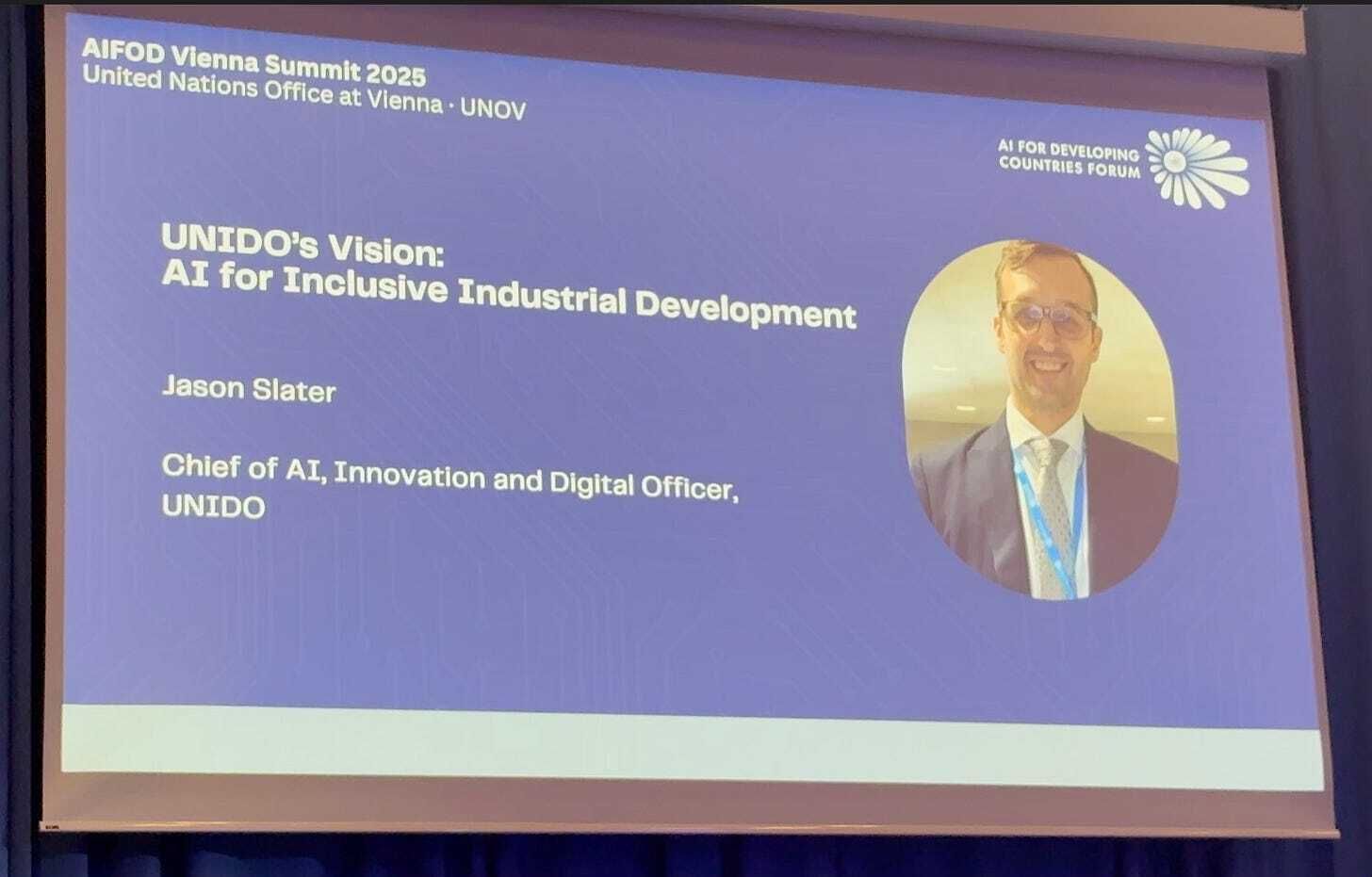- Pascal's Chatbot Q&As
- Posts
- ChatGPT may not help a rice farmer in Ghana, but an AI model trained on soil quality and weather data might.
ChatGPT may not help a rice farmer in Ghana, but an AI model trained on soil quality and weather data might.
Multistakeholder partnerships are critical. It’s not enough for Silicon Valley or Geneva to dictate terms; real inclusion means elevating local universities, startups, and civil society actors.
Jason Slater’s Vision for AI in Industrial Development – A Strategic, Inclusive, and Urgent Call to Action
by ChatGPT-40
At the 2025 AI for Developing Countries (AIFOD) Summit in Vienna, Jason Slater, Chief of AI, Innovation and Digital Officer at UNIDO, delivered a powerful and pragmatic vision for the deployment of artificial intelligence in support of inclusive and sustainable industrial development. His remarks underscored the critical role AI must play in accelerating progress toward the Sustainable Development Goals (SDGs), particularly in the Global South, where infrastructure, education, and access gaps threaten to leave billions behind. Slater’s emphasis on local relevance, global cooperation, and actionable solutions makes his approach not only credible but imperative. I agree strongly with his views and will use this essay to explore why.
A Mandate Rooted in Equity and Action
Slater begins by situating UNIDO’s AI strategy within the context of its overarching mandate: to promote inclusive and sustainable industrialization in line with SDG 9. Rather than chasing shiny objects like generative AI for chatbots or large language models for co-piloting code, Slater zeroes in on pragmatic use cases—how AI can help optimize supply chains, reduce post-harvest loss, and make local agriculture more efficient. This focus on real-world implementation in manufacturing and farming industries is a refreshing contrast to the more hype-driven AI narratives often dominating global tech summits.
His acknowledgment of fundamental structural barriers—such as the digital divide, gender disparities in connectivity (e.g., 264 million fewer women online in Africa), and the global skills gap—grounds his vision in reality. His data-driven outlook makes it clear that deploying AI is not just about infrastructure or compute power; it’s about investing in people, capacity, and purpose.
Building Ecosystems, Not Empires
What distinguishes Slater’s leadership vision is his commitment to ecosystem thinking. He calls for multilateral, cross-sector partnerships involving private companies (Google, Siemens, Huawei), academia (Oxford, Cambridge, Tsinghua), and UN institutions. This is particularly important for developing countries, where unilateral or purely donor-driven efforts often falter without local ownership or systemic integration.
The call for a “pyramid strategy” that starts with thought leadership and policy framing, but cascades into implementation and storytelling, is compelling. Storytelling—highlighting how AI improves coffee production in Ethiopia or reduces rice loss in Ghana—is not fluff; it’s essential to reducing fear and building trust in AI systems, especially where these technologies are perceived as alien or extractive.
From Compact to Impact: Aligning AI with the Global Digital Compact
Slater ties UNIDO’s AI strategy to the emerging Global Digital Compact and the broader SDG framework. His data point—that AI could positively impact 134 of the 169 SDG targets—is both hopeful and urgent. But the power of this insight lies in his next move: translating that potential into action. The Call for Solutions launched with UN Trade and other agencies is a promising example of participatory AI governance. It shifts the narrative from passive observation to active co-creation and invites innovators from the Global South to become agents of change, not just recipients of aid or technology transfers.
He also reiterates the UN’s convening power—through the General Assembly, the UNIDO General Conference, and other platforms—to elevate proven solutions, not just critique the problems. This balance of advocacy and execution is a model many international institutions should emulate.
Do I Agree With Slater’s Views?
Yes—wholeheartedly. Slater strikes the right balance between ambition and realism. Rather than romanticizing AI as a magical solution or demonizing it as a threat, he approaches it as a tool—one that must be adapted to specific developmental contexts and paired with investments in connectivity, education, and local governance.
I particularly agree with three principles underpinning his approach:
Contextualization over Generalization – AI needs to solve the specific problems of each country, sector, and community. ChatGPT may not help a rice farmer in Ghana, but an AI model trained on soil quality and weather data might.
Collaboration over Colonization – Multistakeholder partnerships are critical. It’s not enough for Silicon Valley or Geneva to dictate terms; real inclusion means elevating local universities, startups, and civil society actors.
Solutions over Rhetoric – It is easy to talk about digital divides and SDG failures. Slater shifts the discussion toward implementation and showcases models of success.
Recommendations for Stakeholders
Slater’s address is a roadmap for action. To build on his vision, stakeholders across the ecosystem should:
Governments in developing countries must prioritize AI capacity-building through national AI strategies, public-private tech hubs, and STEM education reform.
Multilateral institutions should fund infrastructure (data centers, broadband), but also support open data and ethical AI policy frameworks.
Private sector actors must go beyond CSR and invest in long-term partnerships that align with local development priorities—not just market entry.
Scholarly publishers can contribute by ensuring access to technical knowledge and localized AI research, including open-access journals and partnerships with local universities.
Civil society and local innovators should be empowered through open calls, like the one Slater announced, to pilot and scale community-driven AI solutions.
Conclusion
Jason Slater’s keynote is a model of grounded optimism and institutional agility. It reminds us that AI is not inherently global; it is shaped by who uses it, where, and for what. By embedding AI into the industrial fabric of developing economies—through smart partnerships, inclusive governance, and a relentless focus on tangible outcomes—UNIDO is offering a blueprint for responsible innovation that leaves no one behind.
In a world racing toward 2030, where 17% of SDG targets are falling behind, Slater’s call to act now is not just timely—it’s essential.
